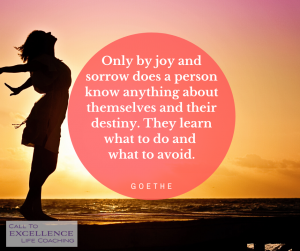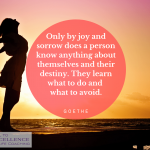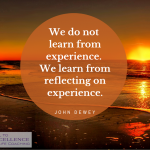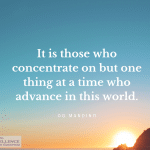
In my last blog post (Reflections on 2019), I mentioned that part of my “experiment” for 2020 involved following my “Joy Compass.”
Now, if you knew me, you would understand how truly bizarre that sounds. I’m the last person anyone would expect to be writing about joy, much less pursuing it. In fact, for my entire adult life, I’ve been a “joy agnostic.” Maybe it exists for some people, maybe it doesn’t, but it didn’t seem to have any relevance for my day-to-day life. It wasn’t practical. It wasn’t going to get me anywhere I want to go.
Me spending a year focusing on joy is as out of character as the Dalai Lama spending a year indulging in earthly pleasures.
But here I am, devoting at least a year to study and pursue joy. (Maybe the Dalai Lama is spending his year exploring hedonism, but I doubt it…)
Why has it taken me so long to warm up to the concept of joy?
It’s not that I had anything against it. Joy sounded like a lovely thing to experience. But as I mentioned above, it didn’t seem to have any practical value. I’ve always been ambitious and goal-oriented, with a vision for what I wanted my life to look like. My perception of joy, or maybe more precisely what it took to experience it, didn’t fit with that vision.
One Universal Path to Joy? Or Many?
From what I had heard or read, there appeared to only be two paths to joy (and I freely admit these may not be accurate – I’m simply sharing how my mind perceived the messaging about joy I picked up along the way):
- The Hippie/New Age Path: This route required you to check out of the rat race, embrace simplicity, eschew money and luxury, focus solely on simple pleasures, minimize personal belongings, maybe grow your own vegetables, practice yoga, and probably listen to NPR.
- The Spiritual/Religious Path: This route required you to devote your life to the study of spiritual matters, abandon all earthly desires and rise above the material plane, kill the ego, and dedicate yourself to self-sacrifice in the name of a higher power or ideal.
Now, there’s nothing wrong with either pathway if they appeal to you. But they didn’t particularly appeal to me. In fact, whenever I tried them on, I felt like an imposter. I like my vacations on the more luxurious side, and you won’t find me camping anytime soon. If I had to grow my own food, I’d soon starve to death. And while I admire people like the Dalai Lama and Mother Teresa, I’ve never been tempted to trade places with them, nor have I ever been tempted to spend months in an ashram like Elizabeth Gilbert (“Eat, Pray, Love”). I’m all for volunteerism and random acts of kindness, but I probably won’t be selling my belongings and moving to a third world country to build orphanages any time soon either.
So if those were the only paths to joy, I just accepted that it didn’t have a place in my life.
But then I started to study people who embodied excellence – people who had risen to the top of their usually very competitive fields. Their lives were neither simple nor overtly spiritual and altruistic. They were people I admired and wouldn’t mind trading places with.
And the one thing I noticed that they all seemed to have in common was that when they discovered their “thing”, the experience they described sounded an awful lot like joy, even if they described it in other words.
Sir Richard Branson’s autobiography is practically an ode to joy – he follows his joy and draws abiding happiness from every aspect of his very complex life, from disrupting industries with new innovative businesses, to spending time with his family, to participating in death-defying adventures, to supporting causes he believes in. Another example: Bruce Springsteen describes the experience of first seeing Elvis on the Ed Sullivan show, and more importantly, discovering rock-and-roll, as electrifying, transcendent, almost ecstatic.
And it’s not just the rich and famous who experience this kind of joy. I was talking with a man at a networking event who contrasted his current career, which brought him a great deal of joy, with previous ones that did not. I asked how he had known he’d known this was the right career, and he said when he started down his current path, “it felt like coming home.” He’d found what he was meant to do.
So I started to wonder… maybe there weren’t just one or two universally proscribed paths to joy… maybe the path was unique for each of us, and therefore, there were as many different paths as there were people on earth…
But maybe there was one universal function.
Joy as a Compass
Maybe joy acts as an internal compass, a GPS, or a beacon – essentially, a form of communication from our higher self/God/Universe – that’s meant to guide us toward the life we were meant to live… a compass that guides us into alignment with who we are meant to be, what we are meant to do, how we are meant to do it, and who we are meant to do it with.
Maybe some people were born with the purpose of exploring spiritual truths or simplicity – and that’s why they experience joy along those paths, because they are in alignment with their soul’s mission. And maybe others of us are born with the purpose of becoming entrepreneurs or artists or athletes or teachers or salespeople, and that’s why we find joy in doing those things.
By following our own unique path to joy, we enable ourselves to express our unique gifts and make our own distinctive, valuable, contribution to the world.
But when we try to follow someone else’s path and passion, we don’t feel the same joy. In fact, we do ourselves, and the world, a disservice when we try to force ourselves into some universal “joy mold.”
In January, the focus of my “Joy Experiment” was getting back to writing more. Writing has always brought me joy (although not necessarily pleasure – a distinction we’ll discuss in a future post), but for a variety of reasons I had basically stopped writing midway through 2019. I felt like there was something missing in my life.
When I started back by committing to writing every day for at least 5 minutes (a very small kaizen-based habit), what I noticed wasn’t so much an overwhelming feeling of giddy happiness, but a sense of alignment. I was back on the path I was meant to be on. Writing is a part of who I am. Making time for it regularly, consistently, made me feel more complete.
Joy And Alignment
So maybe joy isn’t something that we have to search for with rituals like meditation and mindfulness (although those practices may help us quiet our monkey mind enough to be able to connect with our authentic self). And maybe it’s not a reward bestowed by a higher power for following a certain set of rules.
Maybe joy is actually our natural state of being, already present at all times, a natural result of simply being our authentic selves. We squelch it when we try to be who the world or the people around us tell us we should be, but it’s always there, waiting, to help us find our way back to ourselves.
Your Turn
So, tell me – what is your relationship with joy? Is it a guiding principle in your life? Or a nice-to-have? And if it is an important part of your life, what was your path to joy? I’d love to hear about your experiences, so let me know in the comments below!







4 thoughts on “Does Joy Have Any Practical Value?”
Thank you so much for sharing this! Your writing brings me joy – I’m glad it brings you joy, too!
Thanks Kim! More writing on the way!
Powerfully writing Susan!! I can relate and I see that finding joy is unique to the individual. I grew tired of being what I thought everyone else wanted me to be. Thankfully I’ve let that go and embarked on a journey of vulnerability. Looking inward has freed me to be gracious and love my authentic self which brings me joy.
Thank you Elva! I’m so glad you embarked on that journey and embraced your authentic self – your joy brings joy to everyone around you – it’s contagious in a good way! As Marianne Williamson says, “And as we let our own light shine, We unconsciously give other people permission to do the same.” Keep shining 🙂